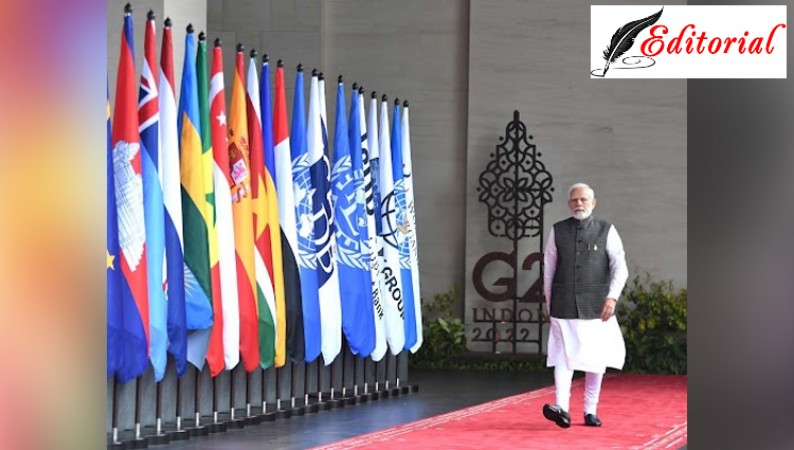
The G-20 leaders' summit held over the weekend, under the leadership of India, stands as a remarkable success, primarily due to the unanimous adoption of the New Delhi Declaration—an outcome that initially appeared improbable. Esteemed experts, seasoned diplomats, and high-ranking officials had consistently downplayed the prospect of India's mediators successfully alleviating the simmering tensions between the "Western" G7-EU alliance and the formidable Russia-China alliance concerning the Ukraine conflict. Historically, only a scant few have achieved such a diplomatic feat. Regrettably, despite concerted efforts, not a single substantive statement has yet received approval within the United Nations Security Council, with both sides consistently issuing denials.
In the annals of international diplomacy, the Indonesian G-20 negotiators managed to produce a joint statement in 2022, containing pointed critiques of Russia—largely at the insistence of the G-7. Nevertheless, this consensus proved ephemeral, as both Russia and China abstained from revisiting such a stance this year. Consequently, in light of the Indian ministerial meetings adjourning without a jointly agreed-upon statement, India's negotiators opted for a more deliberative approach, prioritizing consensus on other pressing matters before broaching the contentious paragraphs related to Ukraine.
The watershed moment materialized when the G7, recognizing the necessity for compromise, softened its stance on including critical language against Russia and instead embraced more neutral language. This achievement defied contemporary global polarization dynamics, with India's "middle path" policy serving as a pivotal driving force. Furthermore, the personal interactions that Prime Minister Narendra Modi conducted with numerous G-20 leaders throughout the year also significantly contributed to this favorable outcome.
Another substantial initiative was the incorporation of the "Southern World" into the proceedings. The global South, comprising numerous G-20 members, had hitherto refrained from taking sides in the dispute, prioritizing global development issues instead. Consequently, the 83-paragraph declaration marked a significant breakthrough in efforts to regulate cryptocurrencies. Additionally, it facilitated much-needed clarity on the allocation of approximately $10 trillion for projects aimed at adapting to climate change and mitigating its impacts. However, a consensus on a timeline for phasing out biofuels remained elusive.
Several other notable initiatives deserve mention: the admission of the 55-member African Union rectified a prevailing imbalance, given that, thus far, only the European Union had enjoyed representation as a regional bloc within the G-20. The establishment of the Global Biofuel Alliance represented a significant stride towards further research and dissemination of alternative energy sources in a world still reliant on biofuels. Finally, the India-Middle East-Europe Economic Corridor exhibited immense promise with its commitment to investments, although the precise details of investment and implementation await resolution.
India's groundbreaking efforts to transcend the conventional single-venue G-20 model deserve commendation. Organizing over 200 meetings across more than 60 cities, drawing over 100,000 official delegates from 125 countries, represents a substantial undertaking, albeit at a considerable cost. The question of whether future G-20 summits will adopt this as a model worth emulating remains open.
Above all, India's endeavors within the G-20 framework seek to "popularize" an organization that had, until now, left an indelible mark primarily through its assembly of world leaders for discussions on weighty yet often inscrutable issues, with limited discernible impact on the lives of the broader global populace. In this vein, Prime Minister Modi's decision to convene an online "review" meeting in November presents an opportunity to ensure the diligent implementation and scrutiny of decisions reached during the weekend summit, as India prepares to pass the chairmanship. In sum, the weekend summit may aptly be described as "India's G-20 moment."